Empowering Global Sustainability Practices Using Publicly Available Online Data
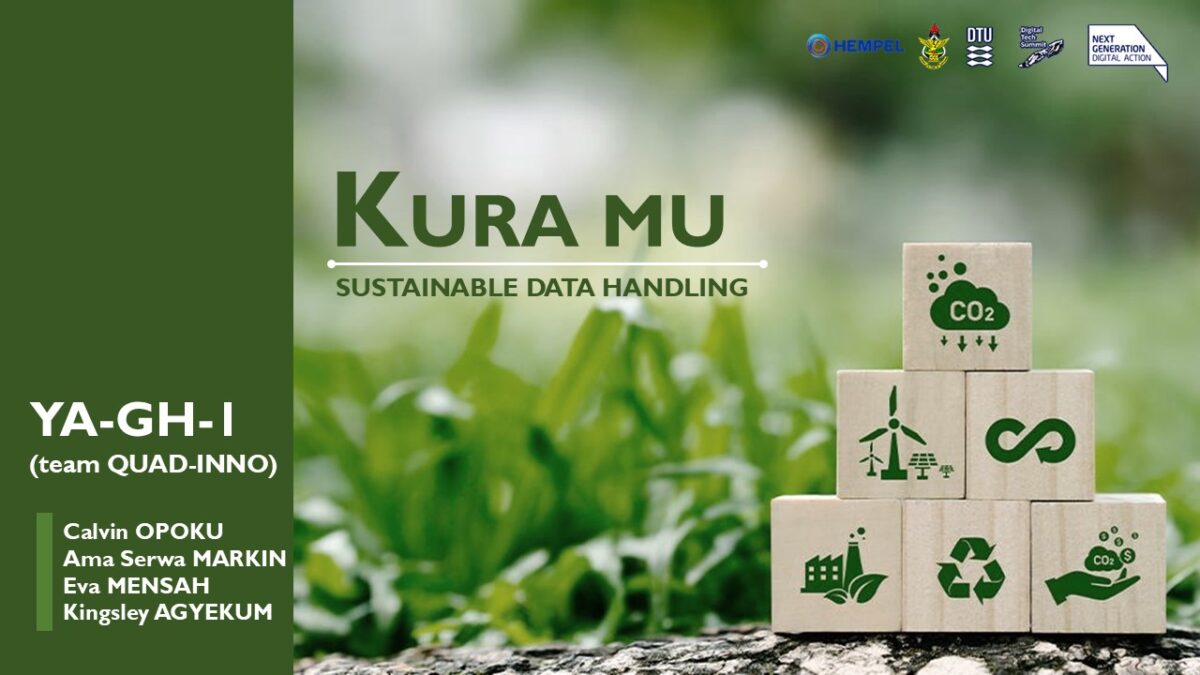
Keywords: Sustainability, Value Chain Partnerships, Materiality, Data Handling, Sustainability Value Propositions
INTRODUCTION
The concept of Sustainability has been at the heart of business operations and academic discourses in recent years, playing a very important role in how corporations, individuals and governments act in relation to the environment. Within the business space, Obaigbena et al. (2024) noted that sustainability principles have driven company strategies and actions across the globe, with such actions becoming more relevant to business operations. These have primarily been influenced either through regulatory measures, or the firm’s need to remain competitive in a market largely characterized by sustainability-driven profit motives (Oduro et al., 2024).
BACKGROUND TO THE PROBLEM
Commitments to sustainability leadership is often marred by a lack of data connections within value chains (Arduini et al., 2024). This in turn, leads to situations where sustainability measures by the parent company differs markedly from the rest of its value chain, creating a significant challenge that requires comprehensive solutions. This lack of data integration makes it difficult to assess sustainability challenges within the value chain. While some have often viewed sustainability from a mere compliance lens; the concept in its true form goes beyond that. It is a strategic priority that influences every aspect of business operations. In this regard, companies like Hempel are focused on understanding the sustainability challenges that exist within its supply chain, as well as those faced by its customers across various industries.
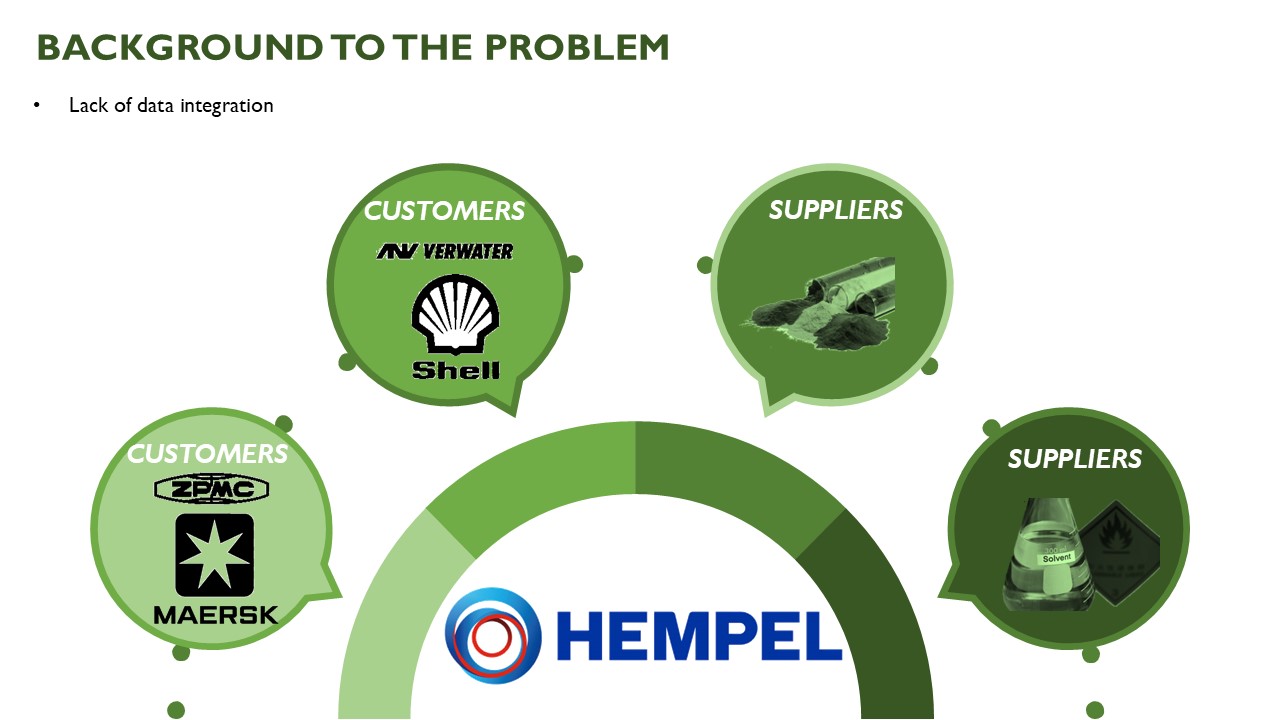
OUTLINING THE CHALLENGE
The process of gathering, cleaning, and analyzing the necessary data needed to create a robust business intelligence network is cumbersome, and also lacks the collaboration needed within the value chain to make it more efficient. Without efficient systems in place, the sheer volume of data related to sustainability – ranging from emissions data to resource use – can overwhelm teams very quickly. Also, the lack of data connectivity within the value chain makes it difficult to gain a comprehensive understanding of sustainability challenges within it.
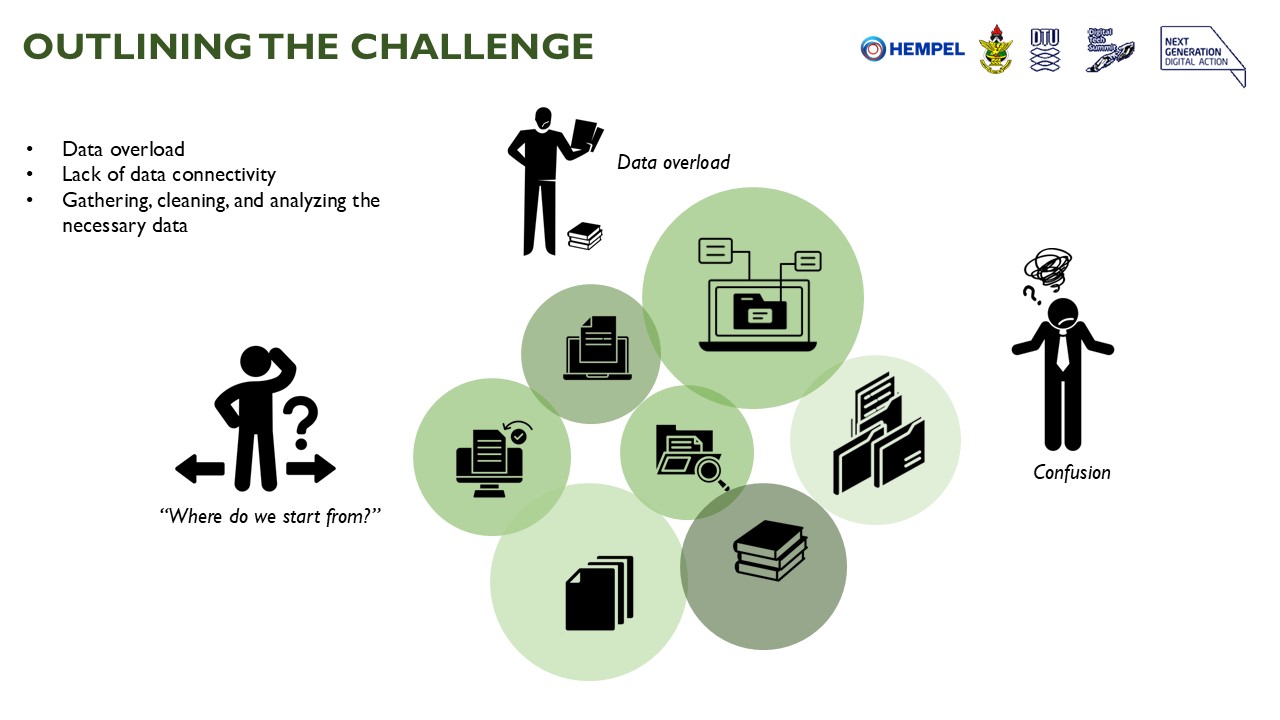
Without a clear grasp of these priorities, it becomes difficult to develop solutions that meet market trends, hindering the ability to create cohesive and impactful sustainability strategies. This challenge is not unique to Hempel, but is a widespread issue across various industries, where businesses struggle to align their sustainability efforts with those of their stakeholders.
THE STATE OF THE PROBLEM TODAY
Today, many companies have begun integrating sustainability reporting into their operations, driven by regulations such as the EU’s Corporate Sustainability Reporting Directive (CSRD), European Sustainability Reporting Standards (ESRS) and frameworks like the Task Force on Climate-related Financial Disclosures (TCFD). However, the process remains largely manual and fragmented, with companies relying on disparate systems to collect and analyze data.

While these efforts have improved transparency and accountability, there is still a significant gap in effectively linking this data to actionable sustainability strategies within value chains, with possible extensions to other industries as well.
CONCEPTUALIZING THE PROBLEM
To have a better grasp of the problem at hand, we set out to conceptualize it based on four criteria: “What” the problem is; “Why” do we need to solve the problem, “Who” the intended beneficiaries of our solution are; and “How” we are going to solve the said problem we have identified.
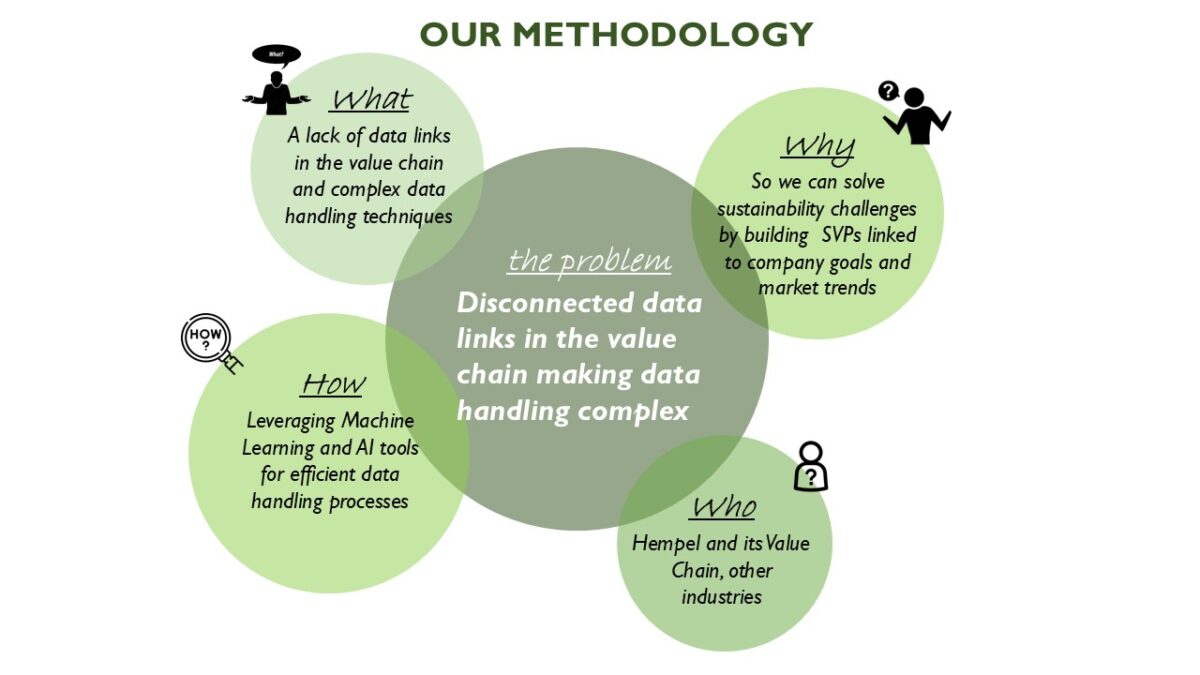
OUR VALUE PROPOSITION
To address this challenge, we propose “Kura Mu”, a fully-integrated web-platform that capitalizes on the speed and efficiency of emerging technologies such as Machine Learning and Artificial Intelligence to create a business intelligence network. “Kura Mu” translates to “Sustain” in the Akan dialect. The term implies handling and maintaining something over a period, which directly relates to the purpose of our solution. This AI platform is built to collect, integrate, and analyze data (Data Handling) that companies can use to create and implement long-term sustainability strategies. By naming it “Kura Mu”, the platform embodies the essence of continuity, resilience and long-term impact in sustainability efforts.
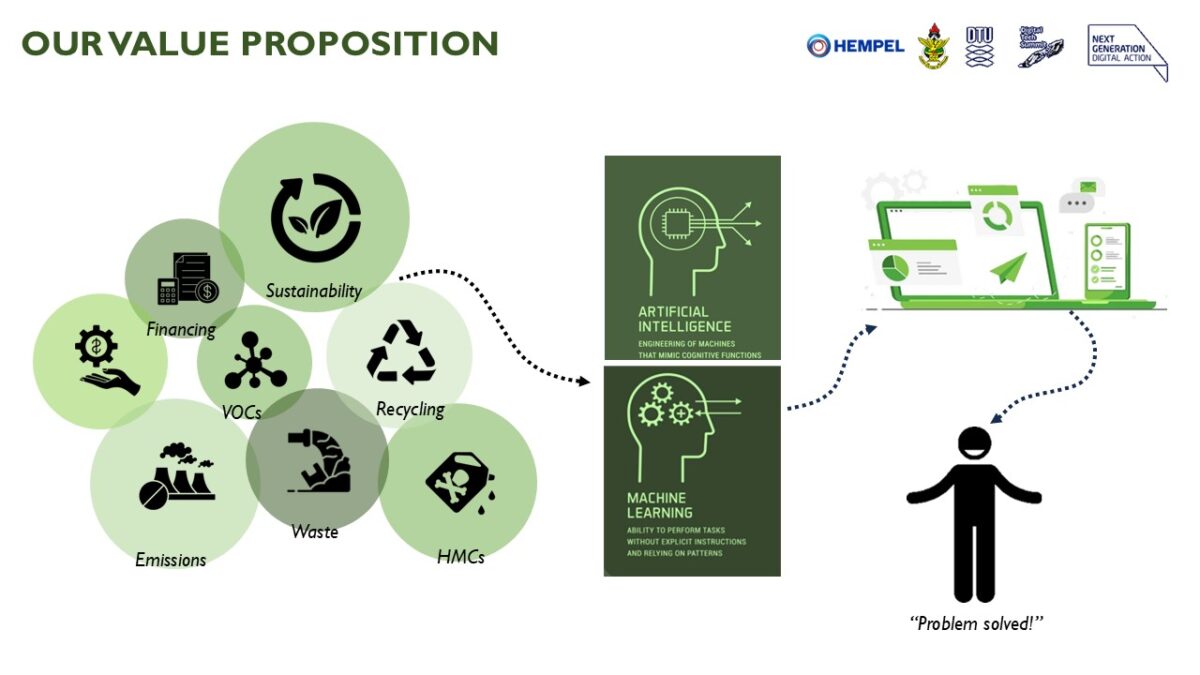
In light of regulatory requirements such as the ESRS, a myriad of sustainability reports are being published annually, with the added advantage of such reports being available for public consumption. Thus, what we want to accomplish is an automated data handling system that can rapidly access these public data, analyze and present key findings to the user in a simple, yet comprehensive format. This automated process allows for a fast-tracked approach towards understanding what the customer wants, and then developing market-centered and company-linked sustainability solutions that are cohesive and collaborative.
HOW OUR SOLUTION WORKS
Unlike traditional systems that work in silos, “Kura Mu” is designed to foster collaboration across value chains, enabling users to contribute to, and benefit from shared sustainability goals. “Kura Mu” allows users to enter the name of the company they want information on in the search bar, after which it uses a web-scraping algorithm to search the internet for the needed information, which is then cleaned and sorted into preprogrammed categories (annual reports, consumer reports, social media data and other 3rd party data). The sorted data is then passed on to an AI data analysis tool that performs comprehensive analysis to identify key insights that the user requires. The resultant information is then presented on an interactive dashboard, as well as in a detailed, exportable one to two-page report (in .pdf, .xlsx, .docs and .html formats), allowing the user to stay ahead of sustainability challenges and market trends.
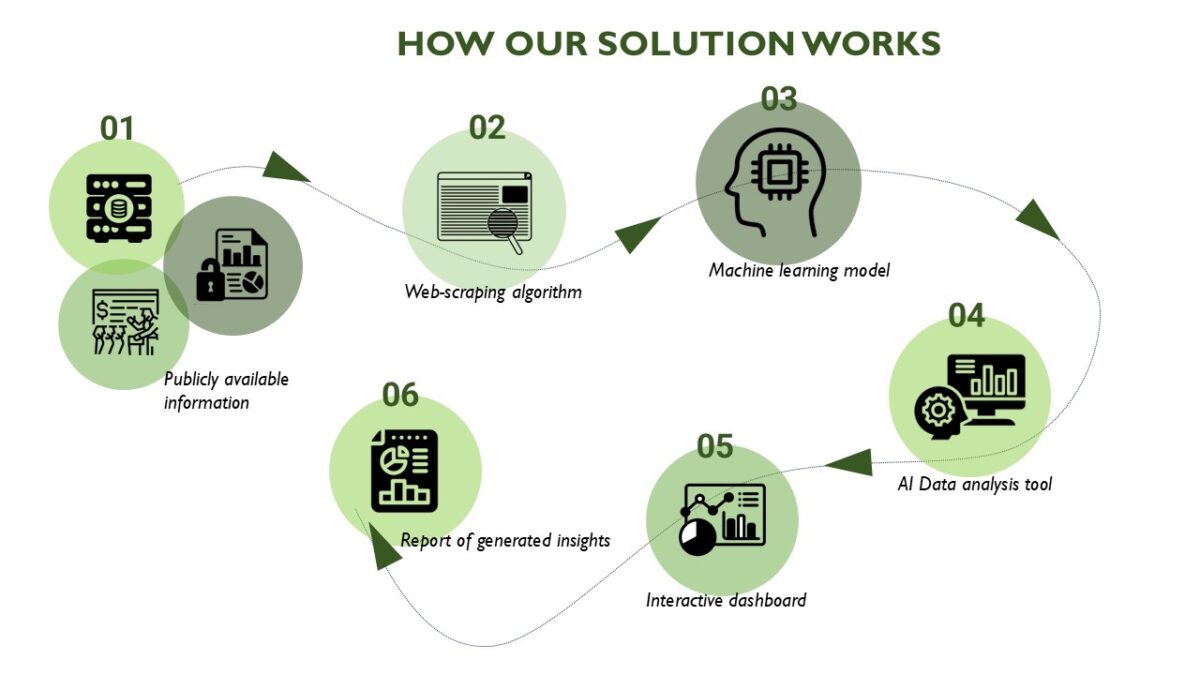
Following the data analysis phase, “Kura Mu” presents the information on an interactive dashboard, a sample of which is shown below.
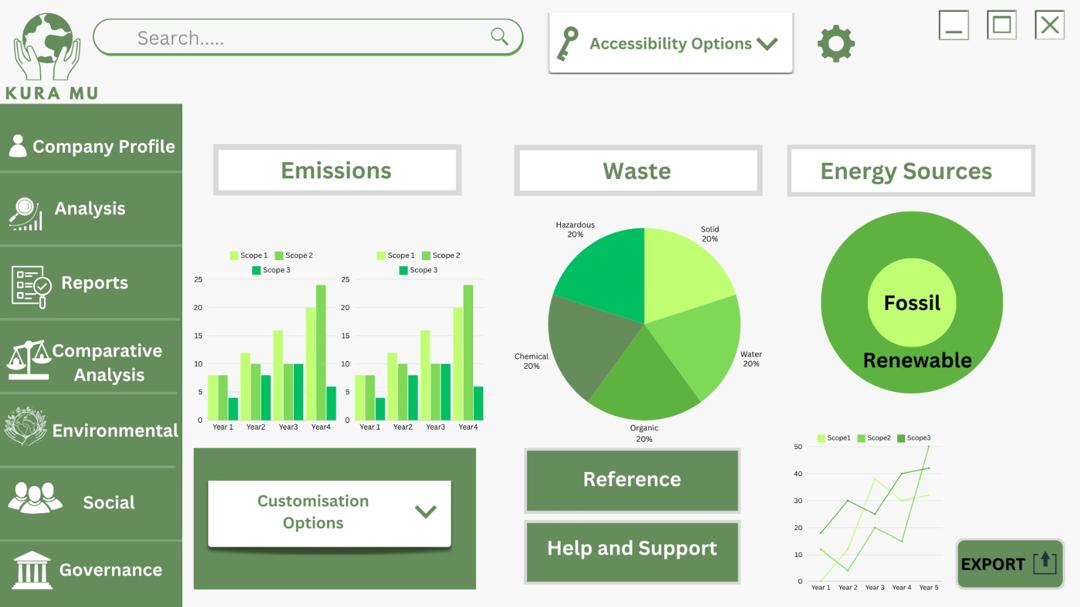
OUR UNIQUE PRODUCT OFFERINGS

ROADMAP

FUTURE PROSPECTS
- IoT integration for extended real-time analysis (Version 2.0)
- Integrating existing company business software (like Hempawise)
- AI-generated solutions
THE TEAM

Calvin Opoku (Team Lead)
MSc Geography and Sustainable Development
2nd Semester

Ama Serwa Markin
Master of Architecture
6th Semester

Kingsley Owusu Agyekum
BSc Telecom Engineering
6th Semester

Eva Mensah
MPhil Computer Science
4th Semester
References
Arduini, S., Manzo, M., & Beck, T. (2024). Corporate reputation and culture: the link between knowledge management and sustainability. Journal of Knowledge Management, 28(4), 1020-1041.
Obaigbena, A., Biu, P. W., Majemite, M. T., Oliha, J. S., & Dada, M. A. (2024). The intersection of geology and business sustainability: a data-driven review of us corporate environmental strategies. Engineering Science & Technology Journal, 5(2), 288-312.
Oduro, P., Uzougbo, N. S., & Ugwu, M. C. (2024). Navigating legal pathways: Optimizing energy sustainability through compliance, renewable integration, and maritime efficiency. Engineering Science & Technology Journal, 5(5), 1732-1751.
